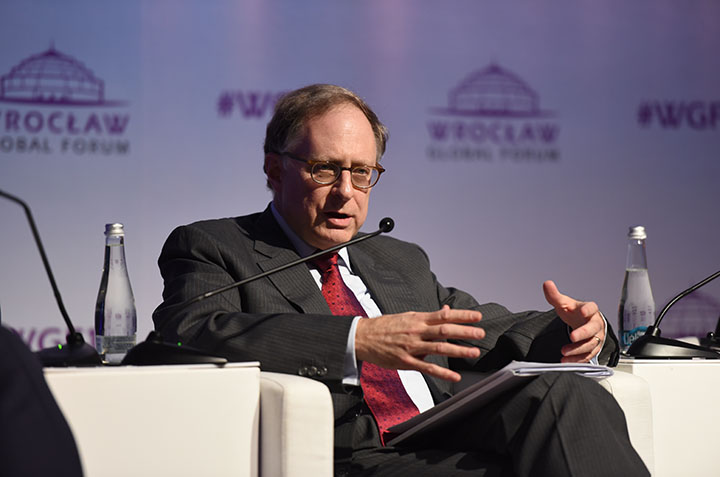 NATO’s Warsaw summit in July is shaping up to be one of the most consequential in the alliance’s history, NATO Deputy Secretary General Alexander Vershbow said on June 3 while noting the growing challenges on Europe’s southern and eastern flanks.
NATO’s Warsaw summit in July is shaping up to be one of the most consequential in the alliance’s history, NATO Deputy Secretary General Alexander Vershbow said on June 3 while noting the growing challenges on Europe’s southern and eastern flanks.
“We face one of the most challenging security environments in decades,” Vershbow said. “We have to step up and meet challenges from a revanchist Russia…and at the same time we have to deal with the arc of crisis that spans the entire Middle East and North Africa region.”
“Failure is not an option as we go into the Warsaw summit,” he added.
Vershbow spoke at the Wrocław Global Forum, a conference jointly hosted by the Atlantic Council, the Polish Institute of International Affairs, and the City of Wrocław in Wrocław, Poland.
Rose Gottemoeller, US undersecretary of state for arms control and international security, US Sen. Joe Manchin (D-WV), Brig. Gen. James J. Mingus, deputy commanding general, 4th Infantry Division of the US Army; and Secretary of State Paweł Soloch of the Polish National Security Bureau also joined the panel. Frederick Kempe, Atlantic Council president and CEO, moderated the discussion.
Russia annexed the Crimea peninsula in March of 2014. It has since supported separatists in eastern Ukraine and provoked NATO states and allies in its neighborhood. In November of 2015, Russo-Turkish relations flared up after Turkey shot down a Russian fighter jet along the Syrian border. NATO backed Turkey’s actions. In April of this year, Russian fighter jets performed a close flyby of US Navy destroyer Donald Cook. US Secretary of State John Kerry said that the United States would have been within its rights to shoot down the jets.
Gottemoeller stressed the need to expect the “unpredictable, unexpected, and destabilizing” behavior of Russian military forces.
“The Kremlin is seeking to project this ‘tough guy’ image to the world,” she said. “We have been concerned about the incidents in the air and the sea because they demonstrate operational threats, but we have responded with highly professional and highly trained behavior.”
From Wales to Warsaw
Leaders from NATO’s twenty-eight member states previously participated in the alliance’s summit in 2014 in Wales—which focused on raising defense budgets for member states and increasing NATO’s military prowess over the next decade. The Warsaw summit in July plans to focus on reinforcing the alliance’s unity toward its eastern flank—in particular, to counter Russia.
Since the Wales summit, NATO “has increased readiness of [its] forces by deploying a spearhead meant to reinforce Eastern allies and [the alliance has] augmented Turkey’s air defenses in light of potential spillover from the Syria conflict,” said Vershbow.
“Wales was the immediate response. Warsaw will be the place where we make the important decisions about long-term adaptation…through strengthening our defense and deterrence posture and projecting stability by doing more by helping our partners build their own defense capacity so they can better equip themselves to fight against the forces of terrorism,” he added.
In Warsaw, NATO leaders will discuss how the alliance can increase the number of significant military exercises on its eastern flank through major troop mobilization operations. Later in June, up to 30,000 troops from twenty-four NATO member states will take part in military exercises in Poland. The alliance will also deploy four battalions across Poland, Estonia, Latvia, and Lithuania.
Defense spending
NATO member states are expected to contribute at least two percent of their GDP to defense spending. Of the twenty-eight members, only five meet this expectation: the United States, the United Kingdom, Greece, Estonia, and Poland.
Manchin critiqued the alliance’s apparent lack of enforcement policy toward member states that do not meet the two percent mark.
“We are very much concerned about how only five out of the twenty-eight [member states] are paying their fair share of dues. We are also concerned that NATO has no recourse and that there is no punishment if they don’t” meet the two-percent goal, said Manchin referring to his work on the Senate Armed Services Committee.
“We are looking at NATO through a bipartisan perspective but Democratic and Republican senators alike are concerned with…how we don’t hold anybody’s feet to the fire and that we are asking to continue to give,” he contended.
Vershbow reminded the panel that NATO’s strength is not entirely based on defense spending. He noted the logistical, operational capability, and military partnerships enable allies to deploy forces more effectively.
“The picture is not entirely bleak. There have been sixteen of the twenty-eight countries that have increased [defense] spending last year…legislating it is a good idea because it takes it out of partisan politics,” said Vershbow.
But, it is not only about spending, he added, noting that the contributions of allies have been impressive and that the lead nations for NATO’s spearhead forces are all European.
Since increased monetary provisions were prescribed to member states at the Wales summit, Vershbow noted that the security and military capability of the eastern theater will take precedence at the Warsaw summit.
“NATO has to be a full-spectrum alliance more than ever before and we need to take a 360-degree approach [to our member states],” said Vershbow.
“We have to show them all that NATO will deliver and I think we will,” he added.
Mitch Hulse is an editorial assistant at the Atlantic Council.
Image: “Failure is not an option as we go into the Warsaw summit,” NATO Deputy Secretary General Alexander Vershbow said at the Wrocław Global Forum in Wrocław, Poland, on June 3. The conference was jointly hosted by the Atlantic Council, the Polish Institute of International Affairs, and the City of Wrocław. (DG ART Projects/www.dgart.pl)

